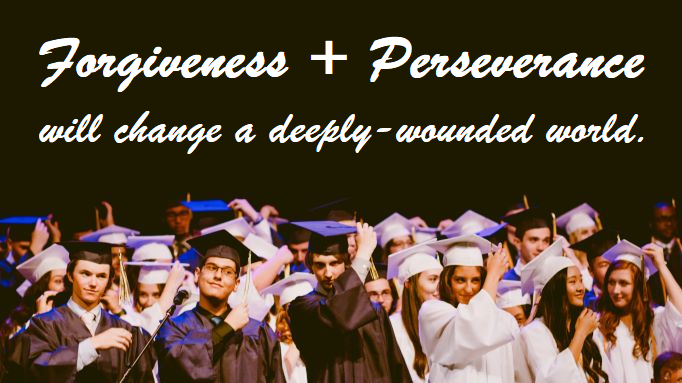Perseverance
Perseverance as the Missing Piece to Family, School, and Community Forgiveness
Having studied the psychology of forgiveness since 1985 and having helped plant forgiveness education in schools since 2002, I have come to realize that there is another moral virtue that needs to exist alongside forgiving if forgiveness is to mature in minds, hearts, and groups. That virtue is perseverance, or the willed decision and action to keep going despite challenges and to not get distracted by other issues. In the ethical treatise, Virtues and Vices (attributed to Aristotle, but possibly written by one of his followers), the virtue of perseverance or endurance is said to exist alongside the virtue of courage and daring. I would add that perseverance will be a moral virtue as long as it is connected to both wisdom and justice (as well as courage) because it is good only if the goal to which people are dedicating a good part of their lives is fair and reasonable. Persevering in bank robbery, for example, is vice not virtuous.
Perseverance is rarely discussed in modern society as we play with our gadgets and move from one forum to another. This kind of quick movement is part of what the 17th century French philosopher, Blaise Pascal, in his masterful work, Pensées, refers to as diversion. He challenged readers by saying that most people cannot endure even one hour alone in their own room without seeking new diversions. If this was the case over four centuries ago, how much more might diversion be weakening our ability to engage in the moral virtue of perseverance now?

In an earlier blog, I related an interaction with Mr. Brian McParland of St. Vincent de Paul Primary School in Belfast, Northern Ireland in the fall semester of 2002. Upon approving forgiveness education in his school, he told me that I would last only 3 years at this task because that is all the time anyone ever seems to give to new classroom initiatives. In other words, people do not persevere. I have seen the same in local groups that start forgiveness education programs with adults only to have them fade over time. Yet, as Aristotle reminds us, and challenges us, it takes time to grow deeply in the moral virtues. We do not become proficient in any moral virtue by giving it a try for a little while any more than we become physically fit by hitting the gym for a month and then going back to the couch and the potato chips. It takes time and effort to become forgivingly fit. It takes time to grow in the moral virtue of perseverance.
So, it seems to me that the first step in growing intra-personally in forgiveness, in aiding families and schools and local community organizations to grow in forgiveness is to openly and boldly and persistently discuss perseverance and the serious challenge all people face as they say, “Let’s hit the forgiveness gym!” Without perseverance, we lose our forgiving fitness very soon.
How much perseverance do we need to change the world? It seems to me that we need to introduce students to forgiveness, without forcing them to forgive, from age 4 to age 18. It seems to me that we need two generations, about 40 years, of forgiveness in communities to change those communities and to change community-to-community conflicts, even brutal conflicts that seem at present to have no end in sight. Forty years? Forty years when there will be new distractions, new shiny diversions? Yes, and it is the teamwork of forgiveness and perseverance, and leaders who will take over for other leaders, that will win in the peace movement. This combination of forgiveness and perseverance never has been tried anywhere in the world at any time in human history. It is time.
With perseverance, we might just be able to bring forgiveness for good to a deeply wounded world. Long live perseverance! Long live forgiveness!
![]()
An Example of Finding Meaning in Deep Suffering: In Honor of Eva Mozes Kor
Consider one person’s meaning in a dramatic case of grave suffering. Eva Mozes Kor was one of the Jewish twins on whom Josef Mengele did his evil experiments in the Auschwitz concentration camp during World War II. In the film Forgiving Dr. Mengele, Mrs. Kor tells her story of survival and ultimate forgiveness of this notorious doctor, also known as the “Angel of Death.”
In describing her imprisonment as a child at Auschwitz, she said, “It is a place that I lived between life and death.” Soon after her imprisonment in the concentration camp, young Eva was injected with a lethal drug, so powerful that Mengele pronounced, after examining her, that she had only 2 weeks to live. “I refused to die,” was her response.
Her meaning in what she was suffering in the immediate short run was to prove Mengele wrong and thus to do anything that she possibly could to survive. Her second meaning in her suffering was to survive for the sake of her twin sister, Miriam. She knew that if she, Eva, died, Mengele immediately would kill Miriam with an injection to the heart and then do a comparative autopsy on the two sisters. “I spoiled the experiment,” was her understated conclusion. A third meaning in her suffering, a longer but still short-term goal, was to endure it so that she could be reunited with Miriam. A long-term goal from her suffering ultimately was to forgive this man who had no concern whatsoever for her life or the lives of those he condemned to the gas chamber. She willed her own survival against great odds, and she made it.
In this case, fiendish power met a fierce will to survive. Upon forgiving Mengele, she saw great meaning in what she had suffered. She has addressed many student groups, showing them a better way than carrying resentment through life. She opened a holocaust museum in a small town in the United States. And she realizes that her suffering and subsequent forgiveness both have a meaning in challenging others to consider forgiving people for whatever injustices they are enduring.
Her ultimate message is that forgiveness is stronger than Nazi power. And it has helped her to thrive.
Robert
» Excerpt from Chapter 5 of the book, 8 Keys to Forgiveness, R. Enright. Norton publishers.
Read more about Eva Mozes Kor and her forgiveness work with Dr. Robert Enright:
- Let’s Heal the World Through Forgiveness
- Nothing Good Ever Comes from Anger
- In Memoriam: Eva Mozes Kor
When It Is Hard to Forgive: Countering Power with Self-Worth
First you need to change your view of who you are as a person if you have been stuck in unforgiveness and are discouraged. The power perspective will tell you that you are less than you should be if your loved ones reject you. Do not listen to the voice of power. It is all too easy to condemn yourself when others first condemn you. Try to counter that power perspective starting now. Who are you as a person? You are someone who has inherent worth even when you struggle in life. You are someone who is special, unique, and irreplaceable even if you have unhealthy anger in your heart. You are not a failure at forgiveness.
Remember that forgiveness is a process that takes time and patience and determination. Try not to be harsh on yourself if you are struggling with this process. How you are doing in this process today is not an indication of where you will be in this process 1 month from now. Who are you?
Excerpt from R. Enright (2015). 8 Keys to Forgiveness. New York: Norton
Reflecting on Resolutions — Again
Editor’s Note: Exactly 10-years ago this week, in this very same website section, Dr. Robert Enright urged his blog followers to consider adopting a New Year’s resolution to “have a strong will as a forgiver.” Given the unprecedented hyperawareness of forgiveness and forgiveness interventions that has developed since then, his 2012 essay “A Reflection on Resolutions” merits an encore. Here is part of what he wrote:
“This New Year’s Day, my challenge to you is: resolve to have a strong will as a forgiver. . . By that I mean your inner determination and behavioral manifestation of staying the course, finishing the race. . . We talk in society about free will and good will, but rarely about the strong will that helps us stay the course.
course, finishing the race. . . We talk in society about free will and good will, but rarely about the strong will that helps us stay the course.
“To forgive requires a free will to say yes to the path of mercy and love, a good will to embrace mercy in the face of unfair treatment, and a strong will so that you do not stop persevering in forgiveness. To persevere in forgiveness is one of the most important things you can do for your family, your community, and for yourself.
“Without the strong will, you could easily be like the rowboat, once tethered to the dock, now loosened from the moorings as it slowly drifts out to sea. As the cares of the world envelope you, the opportunity to cling to the forgiving life may slowly fade until you are unaware that the motivation to keep forgiving is gone.
“Having a strong will means that you will remember what you resolved; you will follow through with the resolution. You have the opportunity to make a merciful difference in a world that seems not to have a strong enough collective will to keep forgiveness alive in the heart. The choice is yours. The benefits may surprise you.”
Dr. Robert Enright, Ph.D., who pioneered the social scientific study of forgiveness, is co-founder of the International Forgiveness Institute. He is also a professor of educational psychology at the University of Wisconsin-Madison and a licensed psychologist. The various titles and labels that have been bestowed on him during his 37-year career devoted to forgiveness include:
- Dr. Forgiveness. . .
- Dr. Bob. . .
- The forgiveness trailblazer. . .
- The father of forgiveness research. . .
- The man who pioneered the social scientific study of forgiveness. . .
- Creator of a Pathway to Forgiveness. . . (the Enright Process Model of Forgiveness)
- The guru of what many are calling a new science of forgiveness. . .
- Aristotelian Professorship in Forgiveness Science. . .
Becoming Forgivingly Fit
Because forgiving others is a moral virtue, we cannot reduce the act of forgiveness to a psychological technique. For example, we cannot engage one time in “the empty chair technique” and have a deeply hurt forgiver sit in the chair of the one who acted unjustly and then gain full insight into that person’s wounds with a resultant overflowing compassion toward that person. To clarify, there is nothing wrong with this technique, but we cannot think of it as complete. As an analogy, if you will take out a gym membership to get into physical shape, your goal is not reached as you go on the treadmill one time or do 20 bicep curls only once. To become physically fit, you need repetition, for a long time.
It is the same with becoming forgivingly fit. Your task is not accomplished by engaging in one set of actions, in one psychological technique. Growing in any of the moral virtues takes time, perseverance, and a strong will to keep at it. As Aristotle reminds us, we need three things to grow in the moral virtues: practice, practice, practice.
We can even engage in our forgiveness practice when we do not have a particular person in mind to forgive today. Here is an example: As we forgive, we struggle to see the inherent worth in others. So, as we interact with people today, even those with whom we are getting along, we can say to ourselves, “This person probably has a history of being wounded in some way by others in the past. This person has built-in worth that cannot be taken away.” As you pass by strangers in a store or on the street, you can say the same about them. The key here is to train one’s mind to see the inherent worth in others so that you can then apply this learning toward those who hurt you, as you decide to forgive.
Here is another idea for growing in forgiveness fitness: Make a list of as many people as you can remember who have hurt you, from your childhood to now. List who the person is, what occurred that was unjust, and your degree of hurt on a 1-to-10 scale. Then order all of these people from the least hurtful (but still a challenge for you now) to the most hurtful. Start with the one person who hurt you the least and go through the forgiveness process with that person. When you think you have accomplished forgiving this one person, and it might take weeks, then go to the next person on the list. Continue until you reach the person who wounded you the most. You then may be ready to forgive this person because you have engaged in practice, practice, practice in forgiving and so your forgiveness fitness likely has increased.
Becoming forgivingly fit takes time, perseverance, and a strong will. As in becoming physically fit, you will notice a difference inside of you that includes well-being and even a sense of wholeness. What do you think: shall we hit the forgiveness gym now?
Robert




